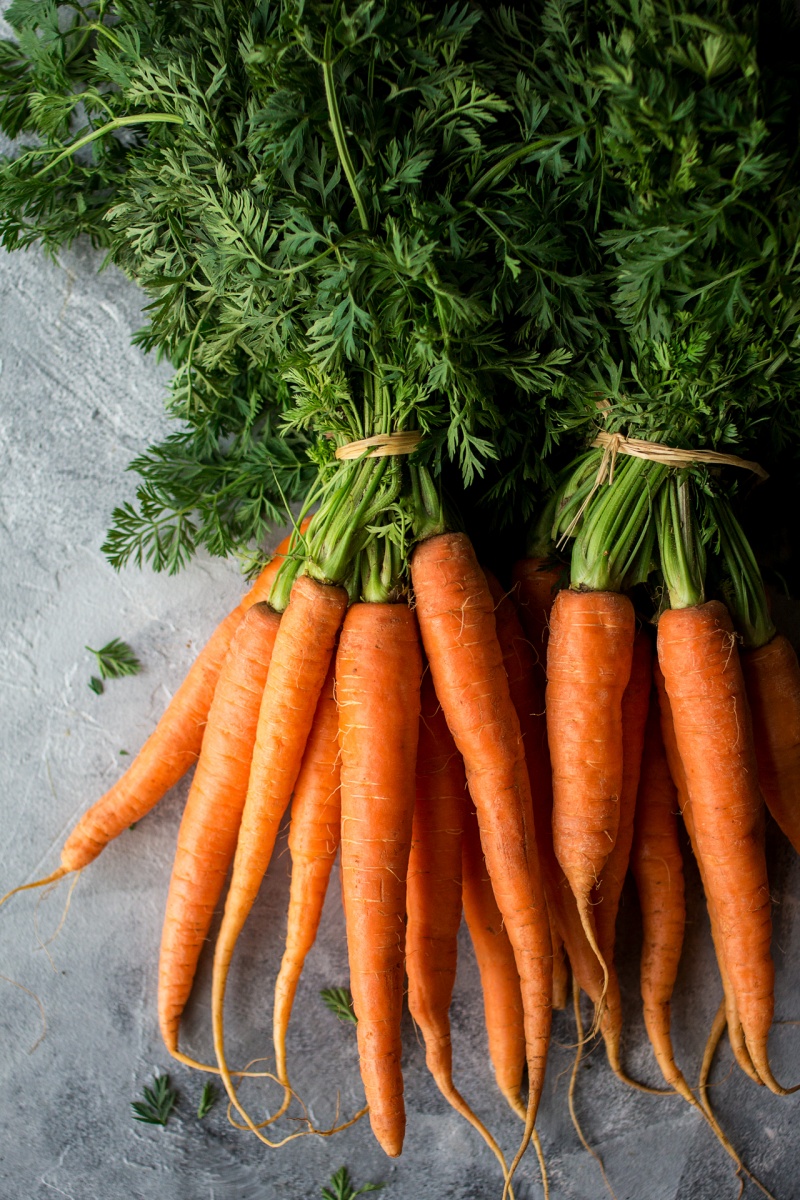Carrots are often thought of as the ultimate health food. Generations of parents have told their children: “Eat your carrots, they are good for you,” or “Carrots will help you see in the dark.”
People probably first cultivated the carrot thousands of years ago, in the area now known as Afghanistan. It was a small, forked purple or yellow root with a bitter, woody flavor, quite different from the carrot we know today.
Purple, red, yellow, and white carrots were grown long before the appearance of the sweet, crunchy, and aromatic orange carrot that is now popular. This type was developed and stabilized by Dutch growers in the 16th and 17th centuries.
This feature is part of a collection of articles on the health benefits of popular foods.
Find out more about the nutrients in carrots, their health benefits, tips for eating more carrots, and any precautions.
Fun Facts on Carrots:
- Here are some key points about carrots. More detail is in the main article.
- Carrots were first grown in Asia, and they were not orange.
- Carrots contain antioxidants, which may protect against cancer.
- While they may not help you see in the dark, the vitamin A in carrots helps prevent vision loss.
- Carrots are available all year round and can be used in savory dishes, cakes, and juices.
Benefits
Evidence suggests that eating more antioxidant-rich fruits and vegetables, such as carrots, can help reduce the risks of cancer and cardiovascular disease.

Carrots are also rich in vitamins, minerals, and fiber. Here are some ways in which carrots might be healthful.
Vision
Can carrots help you see in the dark? In a way, yes.
Carrots contain vitamin A. A vitamin A deficiency can lead to xerophthalmia, a progressive eye disease that can damage normal vision and result in night blindness, or the inability to see in low light or darkness.
According to the National Institutes of Health (NIH), a lack of vitamin A is one of the main preventable causes of blindness in children. Vitamin A deficiency is rare in the United States (U.S.), but eating carrots contributes to vitamin A intake and helps prevent a deficiency. So, in a way, carrots do help you see in the dark.
However, most people are unlikely to experience any significant positive changes in their vision from eating carrots, unless they already lack vitamin A.
Cancer
A variety of dietary carotenoids have been shown to have anti-cancer effects, due to their antioxidant power in reducing free radicals in the body.
Raw, fresh carrots are about 88% water. A medium carrot has only about 25 calories.
Studies have found a possible link between diets rich in carotenoids and a lower risk of prostate cancer, but more evidence is needed to confirm whether the link is causal.
Lung Cancer
Carrots contain beta-carotene. Past studies have concluded that beta-carotene supplementation may reduce the risk of lung cancer.
A meta-analysis published in 2008 found that people with a high intake of a variety of carotenoids had a 21 percent lower risk of lung cancer, after adjusting for smoking, compared with those who did not.
The same pattern was not true for any individual carotenoid, such as beta-carotenoid. Among smokers, beta-carotene supplementation may increase the risk of lung cancer.
Colorectal Cancer
Consuming more beta-carotene may reduce the risk of colon cancer, according to researchers who studied 893 people in Japan.
Leukemia
A 2011 study found that carrot juice extract could kill leukemia cells and inhibit their progression.
Promote Skin Health
Carrots are rich in carotenoids. Research suggests that fruits and vegetables rich in these compounds can improve complexion and one’s overall appearance. They achieve this by giving your skin a healthy glow. Be mindful, though – overconsuming carrots ((or other foods high in carotenoids) can result in a condition called carotenosis, wherein your skin appears yellow or orange.
May Aid Weight Loss
Raw, fresh carrots are about 88% water. A medium carrot has only about 25 calories. Hence, including carrots in your diet is a smart way of fill yourself up without piling on calories.
Carrots also contain fiber. A study showed that meals containing whole and blended carrots resulted in higher satiety levels in the test subjects.
Read more: Household treasures: Cucumbers, hydration and health
Antioxidants and the Color of Carrots
The antioxidant beta-carotene gives carrots their bright orange color. Beta-carotene is absorbed in the intestine and converted into vitamin A during digestion.
Some specialty stores offer carrots in a range of colors, such as purple, yellow, and red. These contain a variety of antioxidants that give them their color. For example, purple carrots contain anthocyanin, and red carrots are rich in lycopene.

Carrots in the Diet
There are two seasons a year for carrots, and local carrots are available in the spring and fall. However, they can be found in supermarkets all year. They can be bought fresh, frozen, canned, or pickled.
Carrots are best stored in the refrigerator in a sealed plastic bag. If the greens are still attached to the top of the carrot, remove them before storing to prevent the greens from drawing out moisture and nutrients from the roots.
Read more: Household treasures: Oats, superfood and skin
Carrots should be peeled and washed before consuming. They are a versatile vegetable. They can be eaten raw, steamed, boiled, roasted, and as an ingredient in many soups and stews.
- Use shredded carrots in coleslaws, salads, wraps
- Add shredded carrots to baked goods, such as cakes and muffins
- Snack on carrot sticks or baby carrots as snack or with herbed dips and hummus
- Use carrots in juice for a sweet, mild flavor
- Raw or steamed carrots provide the most nutritional value.
Risks
Overconsumption of vitamin A can be toxic to humans. It may cause a slight orange tinge in skin color, but this not harmful to health. An overdose of vitamin A is unlikely to happen because of diet alone, but it may result from supplement use.
People who are taking medications derived from vitamin A, such as isotretinoin (Roaccutane) for acne or acitretin for psoriasis, should avoid eating large amounts of carrots, as they could lead to hypervitaminosis A, an overdose of vitamin A.
Anyone who is starting a new medication should check with their doctor about any recommended dietary changes.














